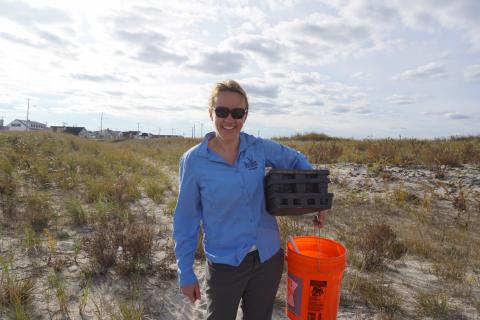In the Weeds with Alyson Eberhardt

UNH Extension staff are in the field every day, working with Granite State residents to make life better in New Hampshire. Because they’re so often on the go, getting to know our specialists and educators can be challenging. That’s why we’ve created In the Weeds, an ongoing series of interviews with Extension staff. Get to know the people behind our programs, discover new opportunities and pick up a few music recommendations along the way.
Name: Alyson Eberhardt
Title: Coastal Ecosystems Specialist
Start Date at Extension: November 2012
Why did you choose your field of work?
I grew up in New Jersey. My experience growing up in a place where sensitive coastal habitats and many people coexist in the same place definitely helped define my career path. I was enamored with the beauty of the landscape and the critters that live along the coast and I knew that we (humans) benefit greatly from these systems. I became very interested in keeping existing habitats intact and functioning while restoring the habitats we had lost. I quickly learned that you have to work with and listen to the people visiting, living and working near these places if you want to be successful. I'm so lucky to be able to do this very thing — work with people to research and restore coastal ecosystems — in my work with Extension, N.H. Sea Grant and the Coastal Research Volunteer program.
If you were told that you could only have one tool to do your job at Extension, what would it be?
Sunscreen. It's not a glamorous tool, but I'm outside a lot where there's no trees or shade.
Describe a memorable experience you have had in your career as an educator.
Anytime I overhear someone who has participated in a Coastal Research Volunteers project sharing their knowledge with another person, I feel excited, inspired and satisfied. We are developing a network of people who are knowledgeable and often passionate about coastal resources and how best to manage them. It's so exciting to see this network grow, whether it be school aged children or adults.
If you had to make a playlist to accompany your program, what five songs would you add first?
“Fall On Me” by R.E.M. The roots of my environmentalism!
“Higher Ground” by Stevie Wonder. Words to live by!
“Fish in the Dish” by Sharon Jones and the Dap Kings. It’s Sharon Jones and fish, what more could you ask for?
“One Nation Under a Groove” by Funkadelic. Aa message of coming together, social justice and silliness.
“This Land is Your Land” by Woody Guthrie. With thumbs up to the covers by Bruce Springsteen and Sharon Jones.
If there was one thing you would want everyone to know about (your field of expertise), what would it be?
Estuaries and coasts are amazing places. And I'm not even talking about the fact that they clean our water, protect our homes and businesses and provide food more effectively than built systems. To live in an estuary or on the coast, you have to have incredible adaptations, particularly if you live in a place like New Hampshire with such harsh winters. Coastal systems are dynamic. Conditions are always changing, whether it’s salt levels, temperature, wave energy, water level, oxygen and so on. It's a crazy place to live, and as a result, the plants and animals that live there are amazing. (Hint: If you volunteer with the Coastal Research Volunteer program, you can get up close and personal with a lot of these plants and animals!)
How can people get in touch with you or learn more about your programming?
The Coastal Research Volunteer website is a great place to start to learn more about our projects. Or people can call or email me directly: alyson.eberhardt@unh.edu or 603.862.6709
Do you have any events coming up that you are excited about?
Each year the Coastal Research Volunteer program supports The Nature Conservancy in collecting data on baby oysters for their oyster restoration program; the fall effort is coming up Oct. 1-4. It's always interesting and fun. You can sign up to join us on the Nature Groupie website. Also, I am working with the N.H. Coastal Program to support coastal landowners in identifying ways you can increase the resilience of your property to storms and flooding. If you live on the coast and would like to learn more, give me a call!
What Extension program, outside of your program area, would we most likely find you at in your free time?
I love insects, but know very little. Maybe I could get an internship in Extension's insect ID lab? Or I'd volunteer for Nutrition Connections. I love cooking and think that program does important work.
